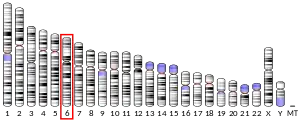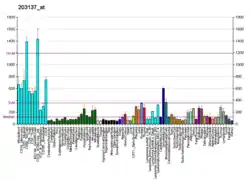| WTAP | |||||||||||||||||||||||||||||||||||||||||||||||||||
|---|---|---|---|---|---|---|---|---|---|---|---|---|---|---|---|---|---|---|---|---|---|---|---|---|---|---|---|---|---|---|---|---|---|---|---|---|---|---|---|---|---|---|---|---|---|---|---|---|---|---|---|
| Identifiers | |||||||||||||||||||||||||||||||||||||||||||||||||||
| Aliases | WTAP, Mum2, Wilms tumor 1 associated protein, WT1 associated protein | ||||||||||||||||||||||||||||||||||||||||||||||||||
| External IDs | OMIM: 605442 MGI: 1926395 HomoloGene: 68422 GeneCards: WTAP | ||||||||||||||||||||||||||||||||||||||||||||||||||
| |||||||||||||||||||||||||||||||||||||||||||||||||||
| |||||||||||||||||||||||||||||||||||||||||||||||||||
| |||||||||||||||||||||||||||||||||||||||||||||||||||
| |||||||||||||||||||||||||||||||||||||||||||||||||||
| |||||||||||||||||||||||||||||||||||||||||||||||||||
| Wikidata | |||||||||||||||||||||||||||||||||||||||||||||||||||
| |||||||||||||||||||||||||||||||||||||||||||||||||||
Pre-mRNA-splicing regulator WTAP is a protein that in humans is encoded by the WTAP gene.[5][6][7]
The Wilms tumor suppressor gene WT1 appears to play a role in both transcriptional and posttranscriptional regulation of certain cellular genes. This gene encodes a WT1-associating protein, which is a ubiquitously expressed nuclear protein. Like WT1 protein, this protein is localized throughout the nucleoplasm as well as in speckles and partially colocalizes with splicing factors. Alternative splicing of this gene results in three transcript variants, two of which encode the same isoform.[7]
Interactions
References
- 1 2 3 GRCh38: Ensembl release 89: ENSG00000146457 - Ensembl, May 2017
- 1 2 3 GRCm38: Ensembl release 89: ENSMUSG00000060475 - Ensembl, May 2017
- ↑ "Human PubMed Reference:". National Center for Biotechnology Information, U.S. National Library of Medicine.
- ↑ "Mouse PubMed Reference:". National Center for Biotechnology Information, U.S. National Library of Medicine.
- ↑ Nagase T, Miyajima N, Tanaka A, Sazuka T, Seki N, Sato S, Tabata S, Ishikawa K, Kawarabayasi Y, Kotani H, et al. (Jul 1995). "Prediction of the coding sequences of unidentified human genes. III. The coding sequences of 40 new genes (KIAA0081-KIAA0120) deduced by analysis of cDNA clones from human cell line KG-1". DNA Res. 2 (1): 37–43. doi:10.1093/dnares/2.1.37. PMID 7788527.
- 1 2 Little NA, Hastie ND, Davies RC (Oct 2000). "Identification of WTAP, a novel Wilms' tumour 1-associating protein". Hum Mol Genet. 9 (15): 2231–9. doi:10.1093/oxfordjournals.hmg.a018914. PMID 11001926.
- 1 2 "Entrez Gene: WTAP Wilms tumor 1 associated protein".
Further reading
- Small TW, Bolender Z, Bueno C, et al. (2007). "Wilms' tumor 1-associating protein regulates the proliferation of vascular smooth muscle cells". Circ. Res. 99 (12): 1338–46. doi:10.1161/01.RES.0000252289.79841.d3. PMID 17095724.
- Horiuchi K, Umetani M, Minami T, et al. (2007). "Wilms' tumor 1-associating protein regulates G2/M transition through stabilization of cyclin A2 mRNA". Proc. Natl. Acad. Sci. U.S.A. 103 (46): 17278–83. doi:10.1073/pnas.0608357103. PMC 1634838. PMID 17088532.
- Rong Y, Cheng L, Ning H, et al. (2007). "Wilms' tumor 1 and signal transducers and activators of transcription 3 synergistically promote cell proliferation: a possible mechanism in sporadic Wilms' tumor". Cancer Res. 66 (16): 8049–57. doi:10.1158/0008-5472.CAN-06-1172. PMID 16912181.
- Rual JF, Venkatesan K, Hao T, et al. (2005). "Towards a proteome-scale map of the human protein-protein interaction network". Nature. 437 (7062): 1173–8. Bibcode:2005Natur.437.1173R. doi:10.1038/nature04209. PMID 16189514. S2CID 4427026.
- Gerhard DS, Wagner L, Feingold EA, et al. (2004). "The Status, Quality, and Expansion of the NIH Full-Length cDNA Project: The Mammalian Gene Collection (MGC)". Genome Res. 14 (10B): 2121–7. doi:10.1101/gr.2596504. PMC 528928. PMID 15489334.
- Beausoleil SA, Jedrychowski M, Schwartz D, et al. (2004). "Large-scale characterization of HeLa cell nuclear phosphoproteins". Proc. Natl. Acad. Sci. U.S.A. 101 (33): 12130–5. Bibcode:2004PNAS..10112130B. doi:10.1073/pnas.0404720101. PMC 514446. PMID 15302935.
- Obuse C, Yang H, Nozaki N, et al. (2004). "Proteomics analysis of the centromere complex from HeLa interphase cells: UV-damaged DNA binding protein 1 (DDB-1) is a component of the CEN-complex, while BMI-1 is transiently co-localized with the centromeric region in interphase". Genes Cells. 9 (2): 105–20. doi:10.1111/j.1365-2443.2004.00705.x. PMID 15009096. S2CID 21813024.
- Utsch B, Kaya A, Ozburun A, et al. (2004). "Exclusion of WTAP and HOXA13 as candidate genes for isolated hypospadias". Scand. J. Urol. Nephrol. 37 (6): 498–501. doi:10.1080/00365590310014517. PMID 14675924. S2CID 34145137.
- Tomsig JL, Snyder SL, Creutz CE (2003). "Identification of targets for calcium signaling through the copine family of proteins. Characterization of a coiled-coil copine-binding motif". J. Biol. Chem. 278 (12): 10048–54. doi:10.1074/jbc.M212632200. PMID 12522145.
- Strausberg RL, Feingold EA, Grouse LH, et al. (2003). "Generation and initial analysis of more than 15,000 full-length human and mouse cDNA sequences". Proc. Natl. Acad. Sci. U.S.A. 99 (26): 16899–903. Bibcode:2002PNAS...9916899M. doi:10.1073/pnas.242603899. PMC 139241. PMID 12477932.
- Ortega A, Niksic M, Bachi A, et al. (2003). "Biochemical function of female-lethal (2)D/Wilms' tumor suppressor-1-associated proteins in alternative pre-mRNA splicing". J. Biol. Chem. 278 (5): 3040–7. doi:10.1074/jbc.M210737200. hdl:10261/162976. PMID 12444081.
- Hoja MR, Wahlestedt C, Höög C (2000). "A visual intracellular classification strategy for uncharacterized human proteins". Exp. Cell Res. 259 (1): 239–46. doi:10.1006/excr.2000.4948. PMID 10942595.
This article is issued from Wikipedia. The text is licensed under Creative Commons - Attribution - Sharealike. Additional terms may apply for the media files.






